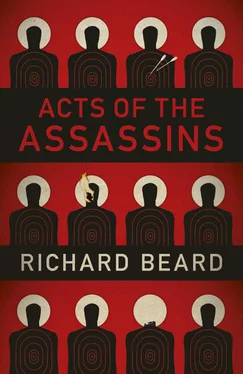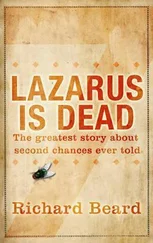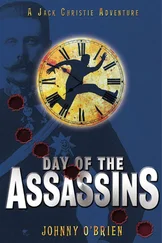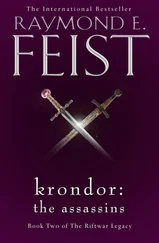John peers intently, straining his Jesus-brown eyes, and only now does Gallio realise that John can barely see. He blinks hard, leans forward, grasps Gallio by the elbows. He stares at the grain of Gallio’s face, and Gallio must be more obviously himself, up this close.
‘I’m sorry I couldn’t be Matthew.’
Years ago in Jerusalem John had been first to arrive at the empty tomb with Peter, and these two disciples let the others know that Jesus had disappeared. Maybe John’s eyesight was failing even then.
‘John, I have a question to ask you. It’s important. When did you last see Jesus?’
‘I’m nearly blind,’ John says. He releases Gallio’s elbows. ‘I see him all the time. Is it Jesus you’re looking for?’
‘I don’t know. I was.’
John fumbles for his juice, and Alma places the carton in his hand. He sucks at the straw and swallows until the carton pulls in on itself. When he puts the carton down it falls over. John takes Alma’s hand, leans forward and aims his gaze vaguely over Gallio’s shoulder. ‘Have you come to kill me?’
‘I’m not an assassin.’
‘Someone wants to kill me, though? You wouldn’t be surprised if I died?’
‘Presumably you’ll die at some point. Like anybody.’
Gallio looks at his daughter, ear squashed against her arm, her thumb rubbing across the top of John’s hand. He wishes he could make himself known to her, but there’s so much to explain. She deserves someone who can take care of her, who isn’t unstable and doesn’t tell lies.
‘Jesus is dead.’
‘You’re mistaken,’ John says. ‘Jesus is coming back.’
‘So Andrew told me. As did Bartholomew, and also Jude. None of you know when or how.’
‘Jesus never went away. This is an orphanage run for the state by the Church. The children here are safe in the hands of Jesus.’
Cassius Gallio knows from Jude that Jesus promised to return while at least one of his disciples was still alive, whichever one he loved most. He’s running out of options, the disciples now down to the last pair standing, with Peter’s execution scheduled for later that day. Gallio checks his watch, but he hasn’t worn a watch in years. He reads the time off his phone. A couple of hours until trumpets, when the Circus Maximus will open for public gratification.
‘Is Peter the beloved disciple?’
‘Jesus loved us all.’
‘But one of you he loved more than the others. Jude said so without my prompting.’
‘He gave Peter the keys,’ John says. ‘He singled him out and called him the rock. Is that what you mean?’
Yes, that would be enough. For Cassius Gallio the story of Jesus is finally coming together, and Valeria has shown too little respect for the subtlety of her opponent. Jesus predicted that Gallio would seek out Alma, his only daughter, so he sent John to the orphanage where the two men were most likely to meet. This is the work of the same Jesus who arranged the fire of Rome to create the conditions for Peter’s public execution. In the years since the alleged resurrection the world’s most modern secret service hasn’t managed a sniff of him. Jesus could be in Rome right now, and Valeria wouldn’t have a clue, because no one can appear and disappear like Jesus.
‘Is Jesus planning his second coming for the Circus?’
John smiles, his face lights up. Then the smile becomes a wince, and he blinks rapidly. ‘I’d very much like to have seen that.’
‘But I suppose you can’t, because you’re blind.’
‘No,’ John says. ‘When Jesus comes back I’ll probably be healed. But I couldn’t get hold of a ticket.’
Cassius Gallio uses the last of his Patras euros on a taxi, but the roads are blocked a long way out from the stadium. Fans ring cowbells and wave flags for their chariot teams. They break into chants, not always good-natured. Circus posters say Eat Chariots Sleep Chariots Drink Coca-Cola but Rome is drinking Italian wine, and plenty of it. Nearer the stadium, on foot, Cassius Gallio and John navigate random tailgate parties, and raised bottles salute them for embracing the spirit of games day — a man who looks like Jesus, in a sleeveless high-viz jacket, leads a man who looks like Jesus who is blind.
John attaches himself two-handed to Gallio’s elbow. They have left Alma in the care of the orphanage, because now that Gallio has John he has less to fear from Valeria. Faced with the choice of taking John to the Circus or kidnapping his own daughter, John is the percentage decision. For the time being Alma is in a safe and caring environment, and one way Gallio can save himself is to be the Speculator who delivers the final disciple. If John is right and Jesus reappears at the Circus, then he’ll deal with that when it happens.
The air temperature dips, unusual for this time of year. John will sense the chill but he can’t see, as Gallio can, other signs that make him anxious. Gallio spots apostles in stained-glass windows, and sculpted disciples in the alcoves of Roman chapels. For the murdered disciples, death is not death. The disciples dominate the Vatican skyline, flanking a triumphant Jesus, mocking their versatile assassins. Simon carries a saw and Thomas a spear and Jude an arrow, their victorious marble whiteness made brighter by the bank of dark cloud descending. John tightens his grip on Gallio’s arm, aching with small-boy excitement.
At the Circus Maximus, increased security means only half the turnstiles are open. Gallio ditches the high-viz jacket because John attracts enough attention as it is, and they join a queue for the bag search. Every bag gets checked. They don’t have any bags. A temporary steward, a woman in a blue suit and white shirt, pats them down. She has no idea how long it will take to get everyone in.
‘Fifteen minutes,’ she guesses. They join another queue, and for John with his limited vision, Gallio thinks, the outside of the stadium probably loses detail — he’ll see no more than a dark mass with an incomplete upper tier of arches, a symbol of Roman ambition defeated by time. After fifteen minutes Gallio stops a second steward who says ‘Fifteen minutes for sure.’ Fifteen minutes later the queue begins to move.
Cassius Gallio and John have tickets for the popular third tier, but nearer the front than the back, on the opposite side of the stadium to where Gallio met Valeria the day before. Not the best seats, but good enough for an unobstructed view of the second coming, which if the Circus ever gets started may end the world by teatime. Gallio excuses himself and his partially sighted friend along the row, making people stand and suck in their stomachs. At their designated places they make themselves comfortable. John puts his hand on Gallio’s arm, then on his knee. Claudia’s seat, on the other side of Gallio, is empty.
‘Bet you can’t believe your luck,’ Gallio says. ‘A spare ticket out of nowhere.’
‘Bet I can.’
‘Look at this place, it’s packed.’
John can distinguish between light and dark but not much else, so Cassius Gallio describes the changing shapes made by a troupe of willing majorettes. They finish their routine as a perfect square and bow to scattered applause. The band of the Ninth Legion marches in, another prelude to the main event. If Jesus has planted a bomb, Gallio thinks, the casualties will be incomparable to those of any outrage before or since. He talks John through Carthaginian drummers, a motorcycle display team, and from the upper tiers behind them some anti-Semitic chanting.
A steward at the end of the row points Claudia to her seat, and gives her a cushion to bring to John. A convert, Gallio suspects, who on his daily guided tours will include a lurid description of Peter’s execution, complete with the number of spectators in attendance and an incontestable date. He will fix Peter’s story on a sharpened point in history, and he’ll ask aloud why this religion among so many rivals survived to the present day. Possibly because the stories told by the disciples are true, he’ll suggest. Jesus did come back from the dead. His disciples were witnesses, and Peter was so convinced by the reality of miracles he died for his beliefs in this very place.
Читать дальше












